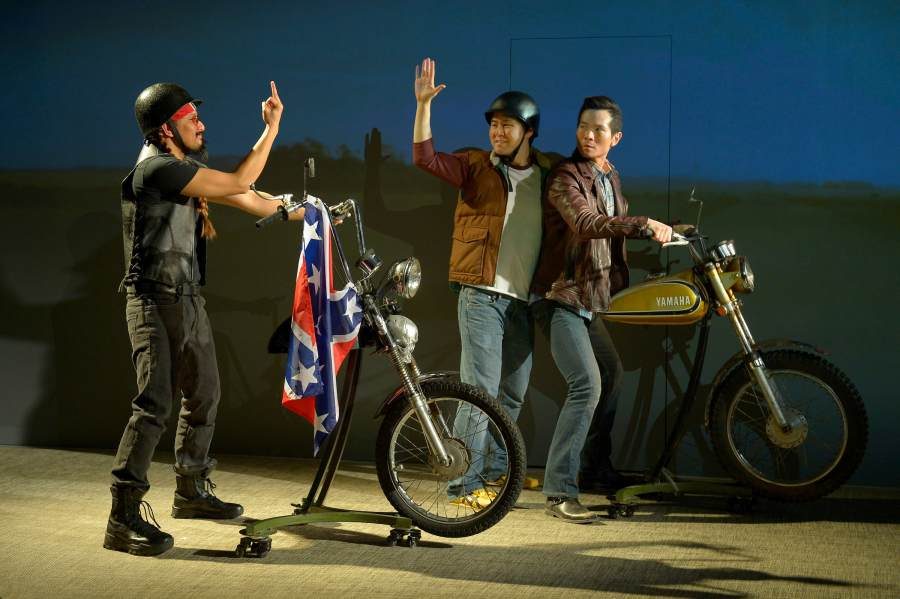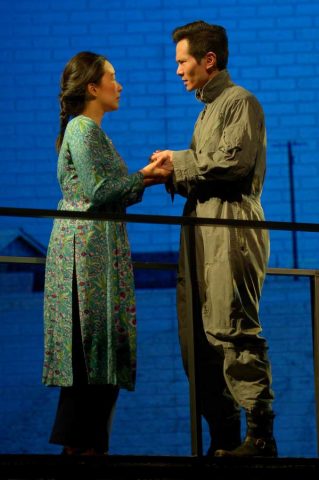

Sex, motorcycles, the Vietnam War, refugee camps, potty-mouthed moms and soul-bearing raps: these and much more make up Qui Nguyen’s Vietgone, currently playing at American Conservatory Theatre’s Strand Theatre here in San Francisco. The over two-hour comedy depicts events of the fall of Saigon in April 1975 from the eyes of Vietnamese characters, in the US and in Vietnam, in a non-chronological narrative. On the way the show intersperses riffs on road-trip and kung-fu movies, lampooning American cultural stereotypes about Vietnam and Asia, while the characters fight social and cultural constraints to find freedom, or something like it.
The cast of five, three assaying multiple roles, excel under director Jaime Castañeda’s fluid staging. Jenelle Chu and James Seol, playing Tong and Quang respectively, form the central relationship of the play. Stranded in Camp Chaffee, Arkansas, a center for Vietnamese refugees, Quang plans to return to Vietnam and his wife, whereas Tong bristles at any attachments to person or place. Mom Huang, sharing the bunk-bed with Tong, refuses to learn English (she eventually relents). Angered over being uprooted, Huang swears incessantly, venting about the US, Americans and their bad Vietnamese, the refugee camp, her daughter, the fact that her son was left behind, and just about anything else, as brilliantly played by Cindy Im. Stephen Hu takes on four roles, most importantly as Quang’s sidekick Nhan. Their mini-epic motorcycle trip across the US to the West Coast, where Tong plans to debark for his homeland, plays out as a riff on Easy Rider and other road movies, with encounters with angry rednecks and a free love hippie couple. The cast is rounded about by Jomar Tagatac, the playwright’s persona onstage (a recent trend perhaps, the playwright as character, as seen also in Branden Jacobs-Jenkins' An Octaroon), as well as playing the aforementioned redneck, hippie “dude,” and other roles. All five bring out the comedy in Vietgone, of which there is plenty, without sacrificing their characters’ integrity.

Designer Brian Sidney Bembridge opts for a simple bare stage with a revolve providing different settings. Dissecting the revolve, a walk way extends above the stage, and titles and visual projected onto the wall. Vietgone has a look reminiscent of a Brechtian production, eschewing realism for a more presentational approach. This approach engages the audience, with raps and monologues revealing the characters’ dreams about both Vietnam and the US, and their frustrations over stereotypes about Asian males and females that limit their agency. The production hews to the idea that the personal is the political, while circumventing larger political issues traditionally associated with the Vietnam War, such as imperialism, colonialism, and the dangers of the US industrial/military complex. Perhaps the most emotionally compelling scene of the play is the last scene, where the playwright interviews a now aged Quang. The most realistic scene of the play, Quang explodes at these larger issues as offered up by the playwright. America saved us, he states. The US gave the Vietnamese hope by taking on the Viet Cong. This unexpected ending frames Vietgone as something much more than just another Vietnam war story told from an American point of view: instead, it emphasizes the personal struggles of the Vietnamese in the US, and back in their homeland, and the power of humor to disarm politics.
Performances of Vietgone continue through April 22. For more information and tickets visit: http://www.act-sf.org/